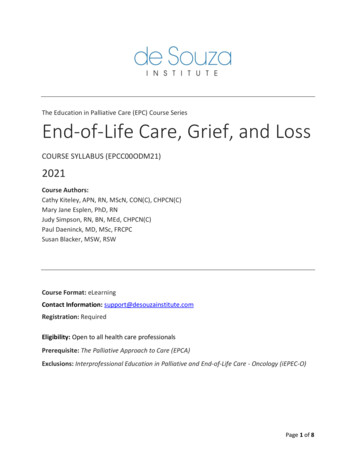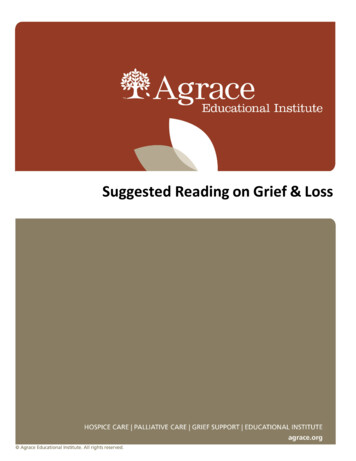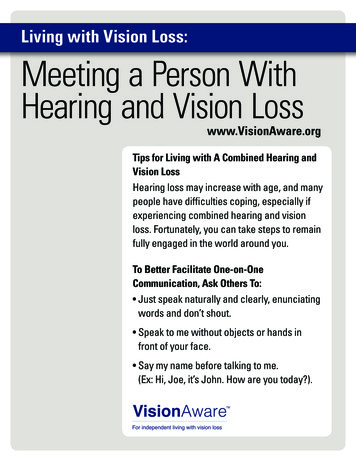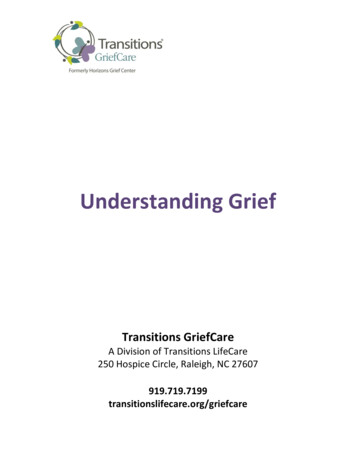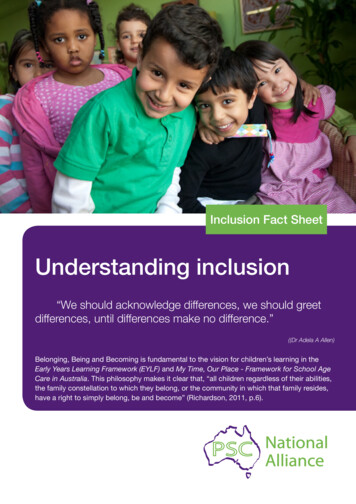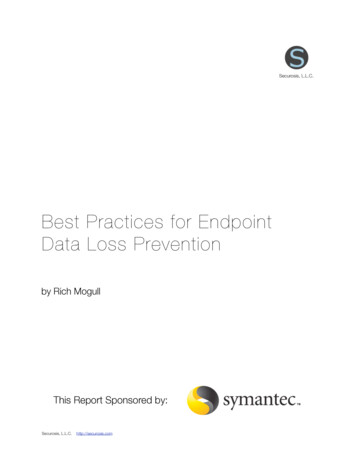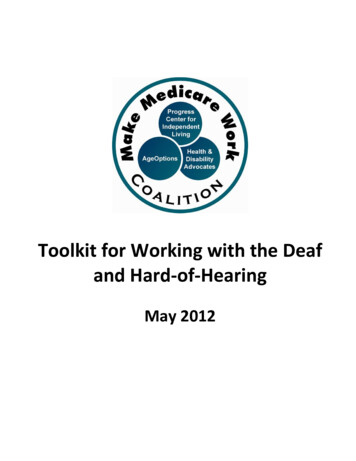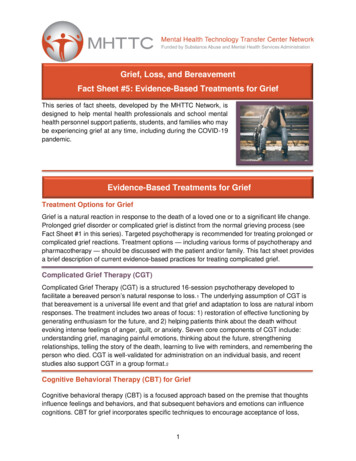
Transcription
Grief, Loss, and BereavementFact Sheet #5: Evidence-Based Treatments for GriefThis series of fact sheets, developed by the MHTTC Network, isdesigned to help mental health professionals and school mentalhealth personnel support patients, students, and families who maybe experiencing grief at any time, including during the COVID-19pandemic.Evidence-Based Treatments for GriefTreatment Options for GriefGrief is a natural reaction in response to the death of a loved one or to a significant life change.Prolonged grief disorder or complicated grief is distinct from the normal grieving process (seeFact Sheet #1 in this series). Targeted psychotherapy is recommended for treating prolonged orcomplicated grief reactions. Treatment options — including various forms of psychotherapy andpharmacotherapy — should be discussed with the patient and/or family. This fact sheet providesa brief description of current evidence-based practices for treating complicated grief.Complicated Grief Therapy (CGT)Complicated Grief Therapy (CGT) is a structured 16-session psychotherapy developed tofacilitate a bereaved person’s natural response to loss. 1 The underlying assumption of CGT isthat bereavement is a universal life event and that grief and adaptation to loss are natural inbornresponses. The treatment includes two areas of focus: 1) restoration of effective functioning bygenerating enthusiasm for the future, and 2) helping patients think about the death withoutevoking intense feelings of anger, guilt, or anxiety. Seven core components of CGT include:understanding grief, managing painful emotions, thinking about the future, strengtheningrelationships, telling the story of the death, learning to live with reminders, and remembering theperson who died. CGT is well-validated for administration on an individual basis, and recentstudies also support CGT in a group format.2Cognitive Behavioral Therapy (CBT) for GriefCognitive behavioral therapy (CBT) is a focused approach based on the premise that thoughtsinfluence feelings and behaviors, and that subsequent behaviors and emotions can influencecognitions. CBT for grief incorporates specific techniques to encourage acceptance of loss,1
modify maladaptive grief-related appraisals, and reduce avoidance behaviors that maintainpathological grief reactions. The treatmentconsists of four core treatment interventions,including 1) psychoeducation about normal andprolonged grief processes, 2) exposure to themost painful aspects of the loss, together with, 3)cognitive restructuring of the loss to enablechange,3 and 4) behavioral activation modified forgrief, to help patients re-engage in previouslymeaningful activities.4 CBT for grief is delivered ingroup and individual settings and typicallyconsists of 12 sessions.Meaning in Loss (MIL) TherapyDrawing on principles of narrative therapy, theMeaning in Loss (MIL) protocol aims to promotethe construction of new and adaptive ways tointegrate the experience of loss and tocompassionately reconnect with the lost lovedone.5 Sessions are divided into groups of modulesthat promote both: a) processing the ‘story’ of theloss and its implications for the survivor’s life, andb) accessing and affirming the ‘back story’ of therelationship with the deceased to enhance continuity and security in the mourner’s selfnarrative. The intervention can be implemented in a face-to-face group therapy and in onlinevideoconference formats,6 and comprises 12–14 sessions organized in a sequence of meaningreconstruction phases.The Family Bereavement Program (FBP)The Family Bereavement Program (FBP) isa group-based treatment for bereavedchildren.7 Caregiver and child programs runin parallel and include 12 two-hour sessionsas well as two additional individual sessionsfor caregivers. Groups for children promoteeffective communication and positiverelationships with caregivers, teach activecoping strategies, decrease negativethoughts about stressors, improve selfesteem, clarify what the child can andcannot control, and increase adaptive2
emotional expression. Education about the grief process, including that death is never thechild’s fault, is also provided.8 Caregiver groups promote positive parenting throughdemonstrated affection and warmth, open communication, effective discipline, and reducing thechild’s exposure to stressful events such as financial concerns. Skills to improve caregivermental health are also provided.Grief and Trauma Intervention for Children (GTI)GTI is a treatment for children who areexperiencing symptoms of grief andposttraumatic stress. The intervention isconducted with children in a group orindividual format in 10 sessions ofapproximately 1 hour with at least one sessionwith the parent. The techniques used in thesessions are grounded in cognitive-behavioraltherapy (CBT) and narrative therapy andinclude narrative exposure to the trauma(through drawing, discussing, and writing),developing an in-depth, coherent narrativewhile eliciting the child's thoughts and feelings, developing positive coping strategies, andmaking meaning of losses.9Peer-Based Grief Support InterventionsPeer support programs are an organized strategy for giving and receiving help between peoplewho share common experiences, including those who have experienced loss or grief. Peersupport is shown to reduce grief symptoms and increase well-being and personal growth amongbereaved survivors. There are also benefits to providers of peer support, including increasedpersonal growth and positive meaning in life. Internet-based peer support programs are agrowing trend, found to be beneficial in part due to their accessibility.10Medications for Complicated GriefStudies regarding the efficacy of pharmacologicalapproaches for treating complicated grief arelimited. There is some preliminary support for theuse of antidepressant medications, such asselective serotonin reuptake inhibitors (SSRIs), inreducing grief symptoms.11 Some experts suggestthat medications may be a useful adjunct topsychotherapy, and studies testing this combinedapproach are ongoing. Until further evidencebecomes available, the role of medications in3
treating complicated grief remains unclear. Data on the efficacy of psychotherapy are morerobust than for medications, and therefore, therapy should be considered a first-line treatmentfor prolonged or complicated grief responses.SummaryGrief is an ongoing and important factor of the COVID-19 pandemic that will continue to affectmany of our clients and their families. Prolonged Grief Disorder is a mental health conditioncharacterized by persistent and pervasive longing for the deceased individual that causessignificant impairment in functional aspects of the person’s daily life (see Fact Sheet #1 of thisseries for more information). Physical distancing and other restrictions during the pandemiccould make it difficult to say goodbye to loved ones or hold memorial services, which mayincrease risk for complicated grief reactions. Individual and group psychotherapies arerecommended treatments for clients experiencing symptoms of prolonged grief, and severalevidence-based treatments have been established.ResourcesAssociation for Behavioral and Cognitive Therapies: Katherine Shear Recorded Webinar: ComplicatedGriefCenter for Complicated Grief at Columbia University: Promoting Resilience in Bereaved Children andParentsCenter for Complicated Grief at Columbia University: WebinarsHospice Foundation of America: How to Develop and Manage Virtual Grief Support GroupsInternational Society for Traumatic Stress Studies: Online Learning LibraryPortland Institute for Loss and Transition: GTMR: An Attachment-Informed Approach IPortland Institute for Loss and Transition: GTMR: Grief & Its ComplicationsPortland Institute for Loss and Transition: When Grief Goes Viral: Psychological Assessment andIntervention in the COVID-19Please visit the MHTTC COVID-19 Grief, Loss and Bereavement Webpage for additionalresources, webinars, and training toolkits.DisclaimerThis presentation was prepared for the Mental Health Technology Transfer Center (MHTTC) Network under a cooperative agreement from the SubstanceAbuse and Mental Health Services Administration (SAMHSA). All material appearing in this presentation, except that taken directly from copyrighted sources,is in the public domain and may be reproduced or copied without permission from SAMHSA or the authors. Citation of the source is appreciated. Do notreproduce or distribute this presentation for a fee without specific, written authorization from the MHTTC Network. For more information on obtaining copiesof this presentation, please email NETWORKOFFICE@MHTTCNETWORK.ORG. The opinions expressed herein are the views of the presenters and do notreflect the official position of the Department of Health and Human Services (DHHS) or SAMHSA. No official support or endorsement of DH HS or SAMHSAfor the opinions described in this presentation is intended or should be inferred.4
References1.Shear, M. K. & Bloom, C. G. (2017). Complicated Grief Treatment: An evidence-based approach to grieftherapy. Journal of Rational-Emotive & Cognitive-Behavior Therapy, 35, 6-25. doi:https://doi.org/10.1007/s10942-016-0242-22. Supiano, K. P. & Luptak, M. (2014). Complicated grief in older adults: A randomized controlled trial ofcomplicated grief group therapy. The Gerontologist, 54, 840-856. doi: https://doi.org/10.1093/geront/gnt0763. Boelen, P. A., de Keijser, J., van den Hout, M. A., & van den Bout, J. (2007). Treatment of complicated grief: Acomparison between cognitive-behavioral therapy and supportive counseling. Journal of Consulting andClinical Psychology, 75, 277-284. doi: https://doi.org/10.1037/0022-006X.75.2.2774. Papa, A., Rummer, C., Garrison-Diehn, C., & Sewell, M. T. (2013). Behavioral activation for pathological grief.Death Studies, 37, 913-936. doi: https://doi.org/10.1080/07481187.2012.6924595. Neimeyer, R. & Thompson, B. (2014). Meaning making and the art of grief therapy. In B. E. Thompson & R. A.Thompson (Eds.), Grief and expressive arts: Practices for creating meaning (pp. 3-13). Routledge/Taylor &Francis Group.6. Neimeyer, R. A. & Alves, D. (2016). Seeking meaning in loss: An online narrative constructivist intervention forcomplicated grief. Grief Matters: The Australian Journal for Grief and Bereavement, 19, 68-73.7. Sandler, I. N., Ayers, T. S., Wolchik, S. A., Tein, J.-Y., Kwok, O.-M., Haine, R. A., , & Griffin, W. A., TheFamily Bereavement Program: Efficacy evaluation of a theory-based prevention program for parentallybereaved children and adolescents. Journal of Consulting and Clinical Psychology, 71, 587-600. doi:https://doi.org/10.1037/0022-006X.71.3.5878. Haine, R. A., Ayers, T.S., Sandler, I. N., & Wolchik, S. A. (2008). Evidence-based practices for parentallybereaved children and their families. Professional Psychology, Research, and Practice, 3, 113-112. doi:https://doi.org/10.1037/0735-7028.39.2.1139. Salloum, A. (2015). Grief and trauma in children: An evidence-based treatment manual. New York, NY:Routledge.10. Bartone, P. T., Bartone, J. V., Violanti, J. M., & Gileno, Z. M. (2019). Peer support services for bereavedsurvivors: A systematic review. Journal of Death and Dying, 80, 137-166. doi:https://doi.org/10.1177/003022281772820411. Bui, E. B., Nadal-Vicens, M, & Simon, N. M. Pharmacological approaches to the treatment of complicated grief:Rationale and a brief review of the literature. (2012). Dialogues in Clinical Neuroscience, 14(2), 149-157.Authors:Andrea G. Alioto, PhD, LPMindy Chadwell, PhD, LP, BCBAJennifer Baran-Prall, LCSWRicardo Canelo, BAÁngel D. S. Casillas Carmona, MHSHeather Gotham, PhDLouis Kurtz, MEdKatty Rivera, MEdPJ Wenger, LPC, MFT, NCCLeora Wolf-Prusan, EdDMHTTC Network Coordinating OfficeMid-America MHTTCSouth Southwest MHTTCMHTTC Network Coordinating OfficeNational Hispanic and Latino MHTTCMHTTC Network Coordinating OfficeGreat Lakes MHTTCNortheast and Caribbean MHTTCNortheast and Caribbean MHTTCPacific Southwest MHTTC, School Mental Health Lead5September 2020
Cognitive Behavioral Therapy (CBT) for Grief Cognitive behavioral therapy (CBT) is a focused approach based on the premise that thoughts influence feelings and behaviors, and that subsequent behaviors and emotions can influence cognitions. CBT for grief incorpor


